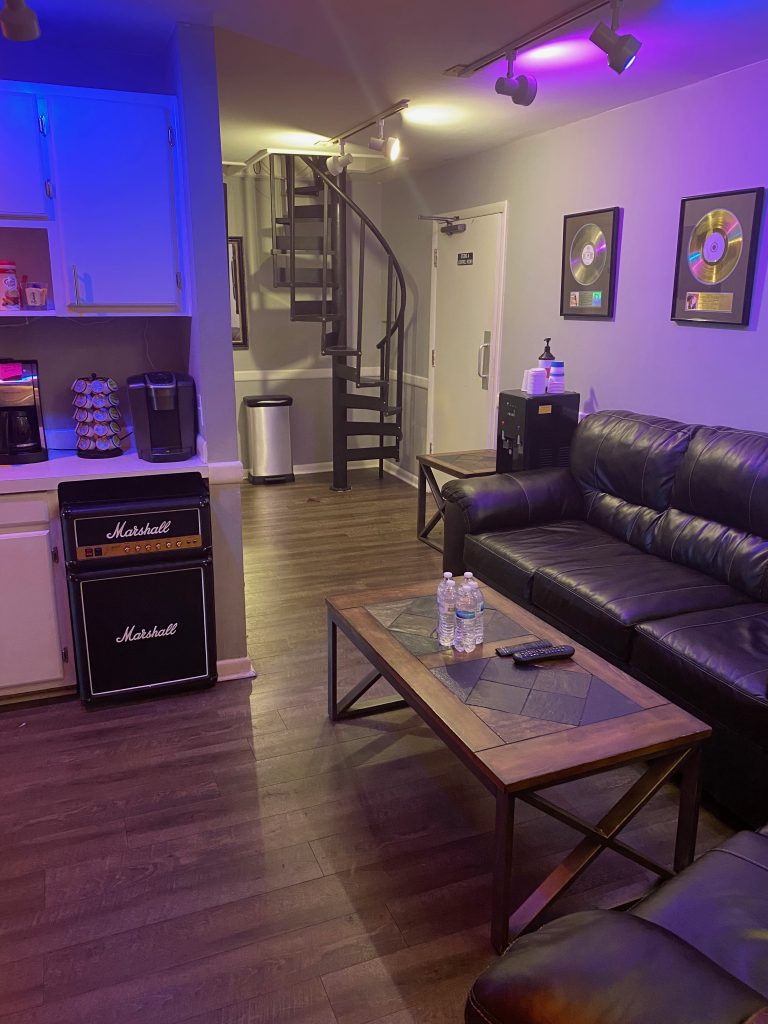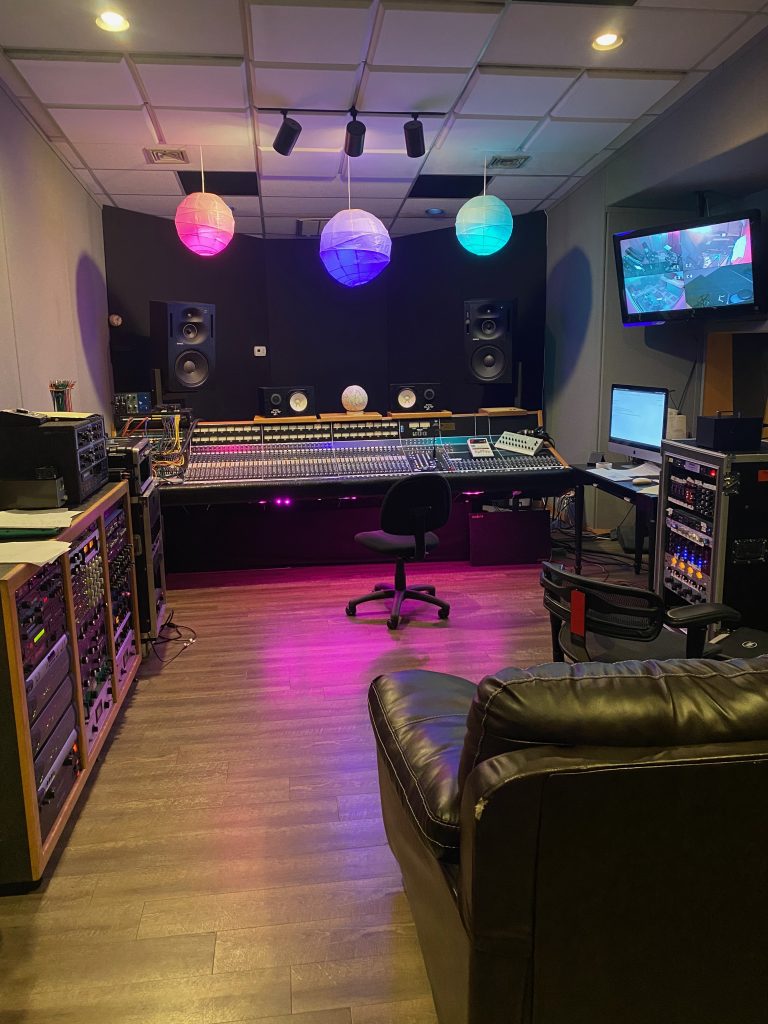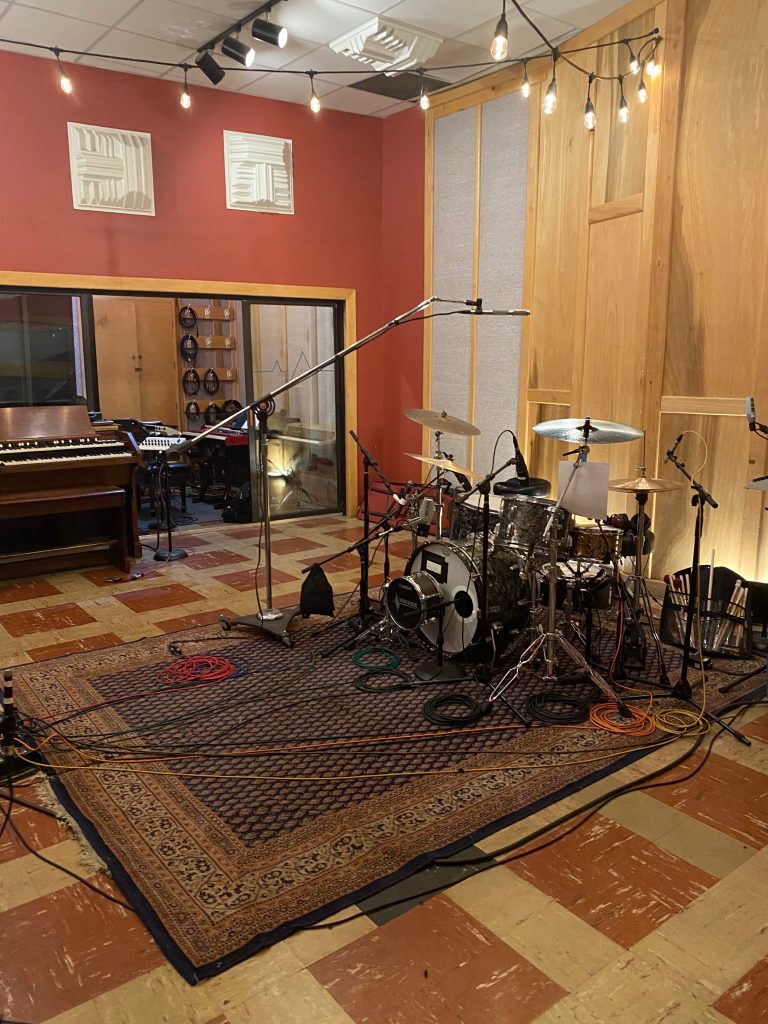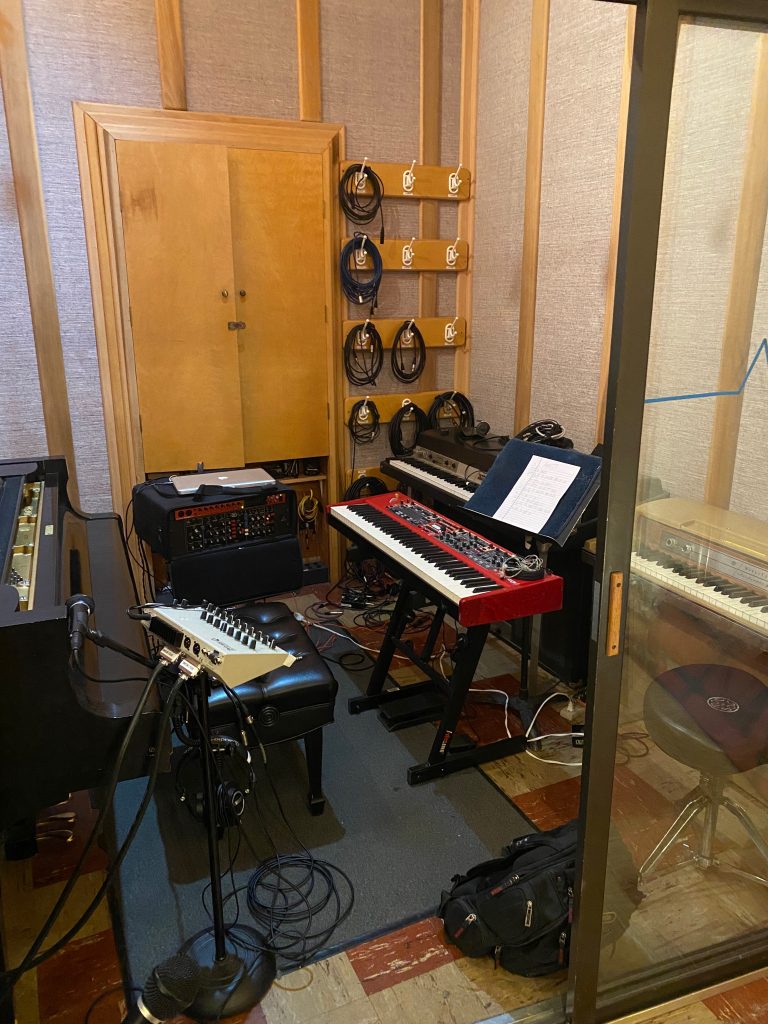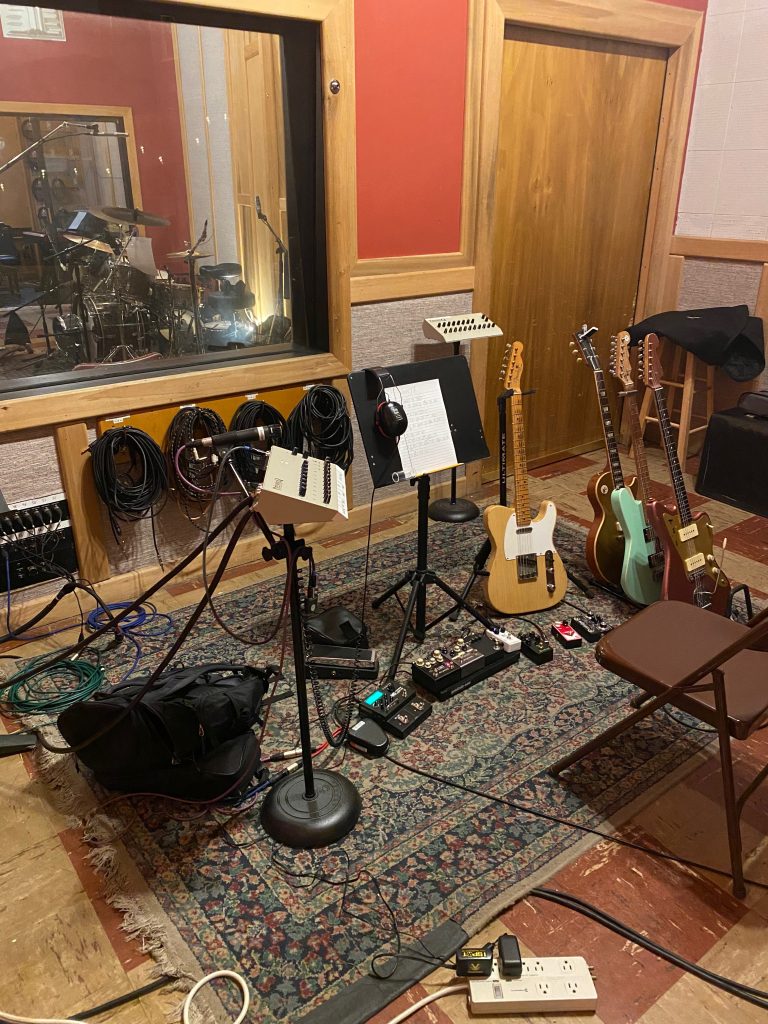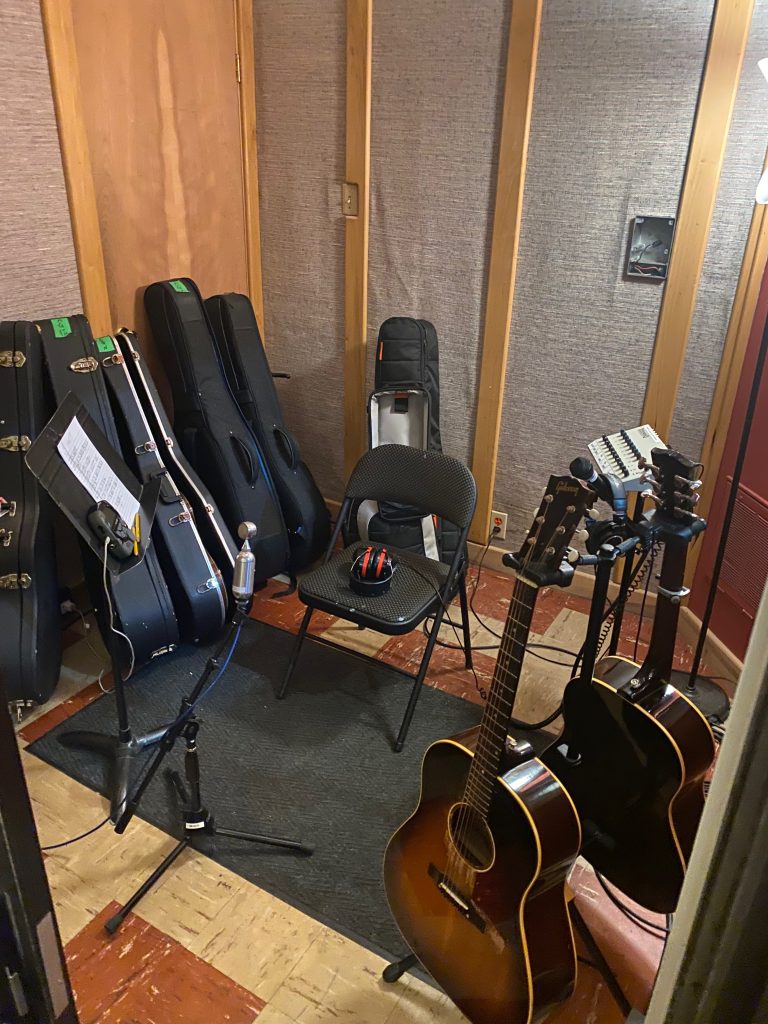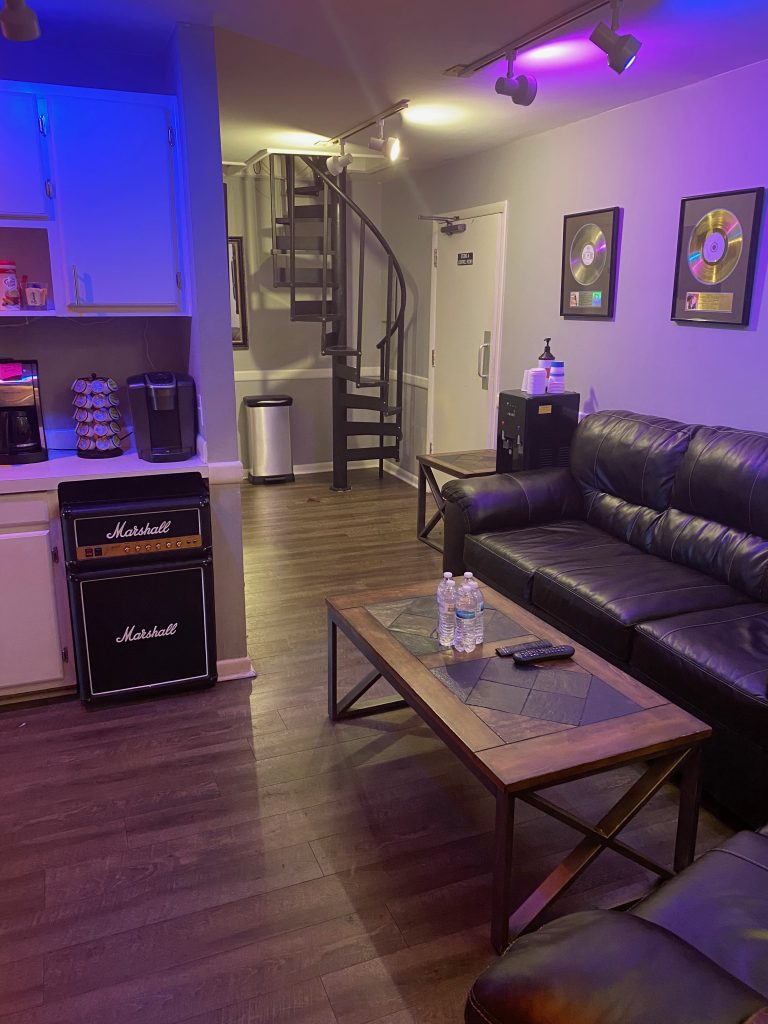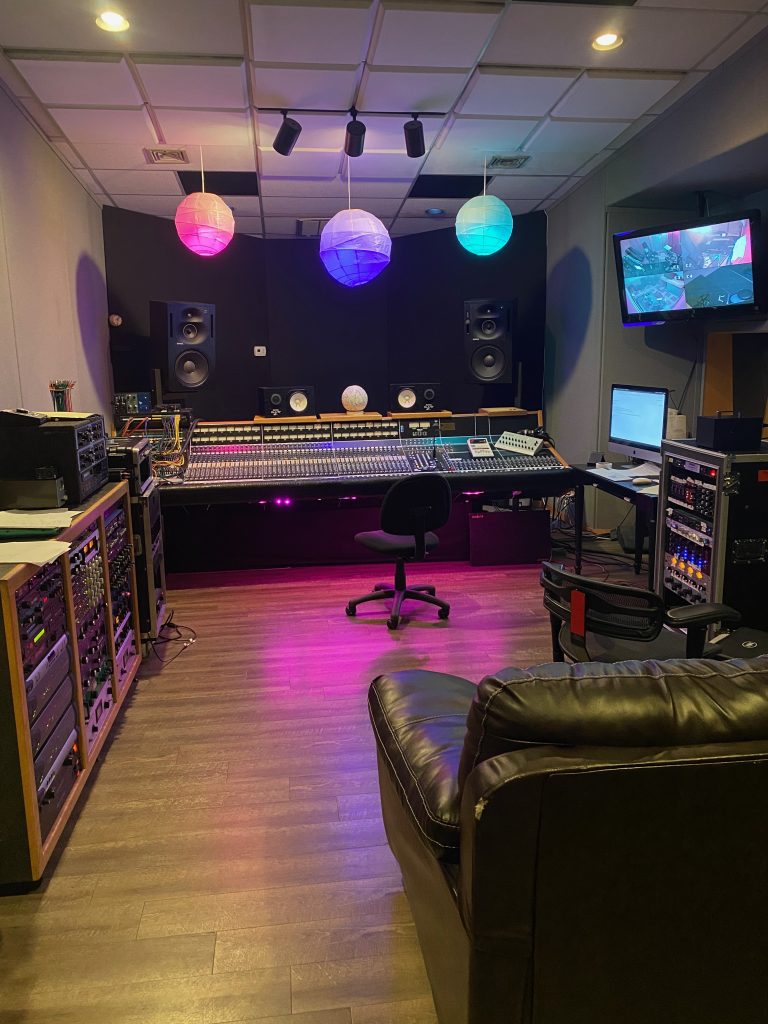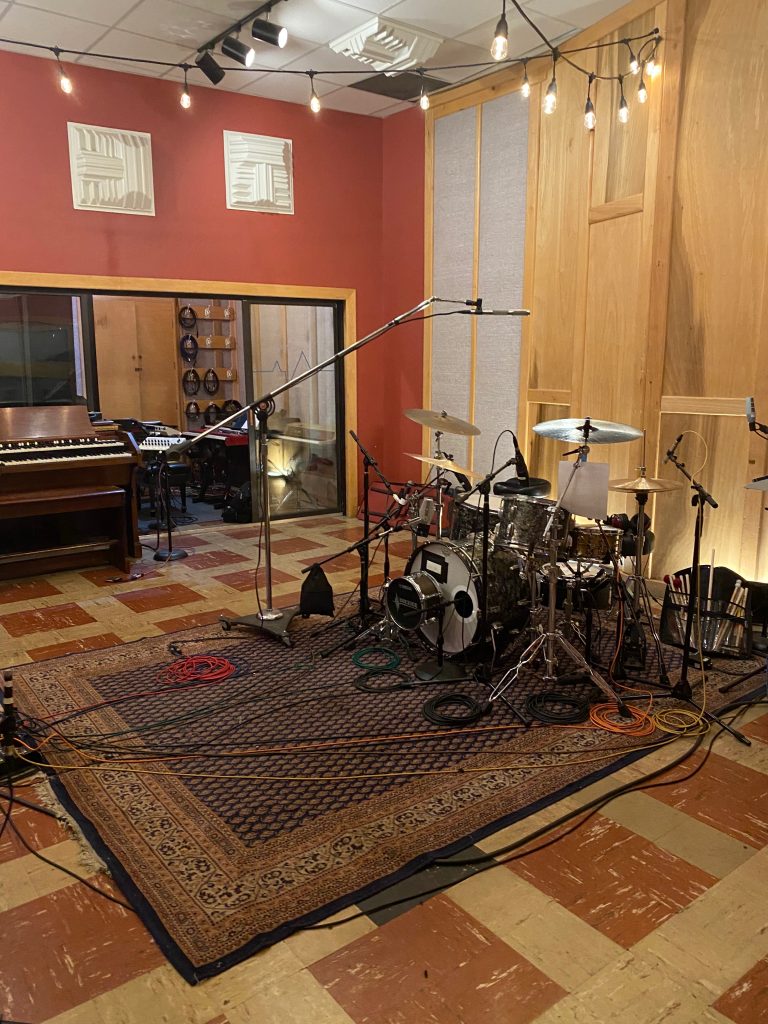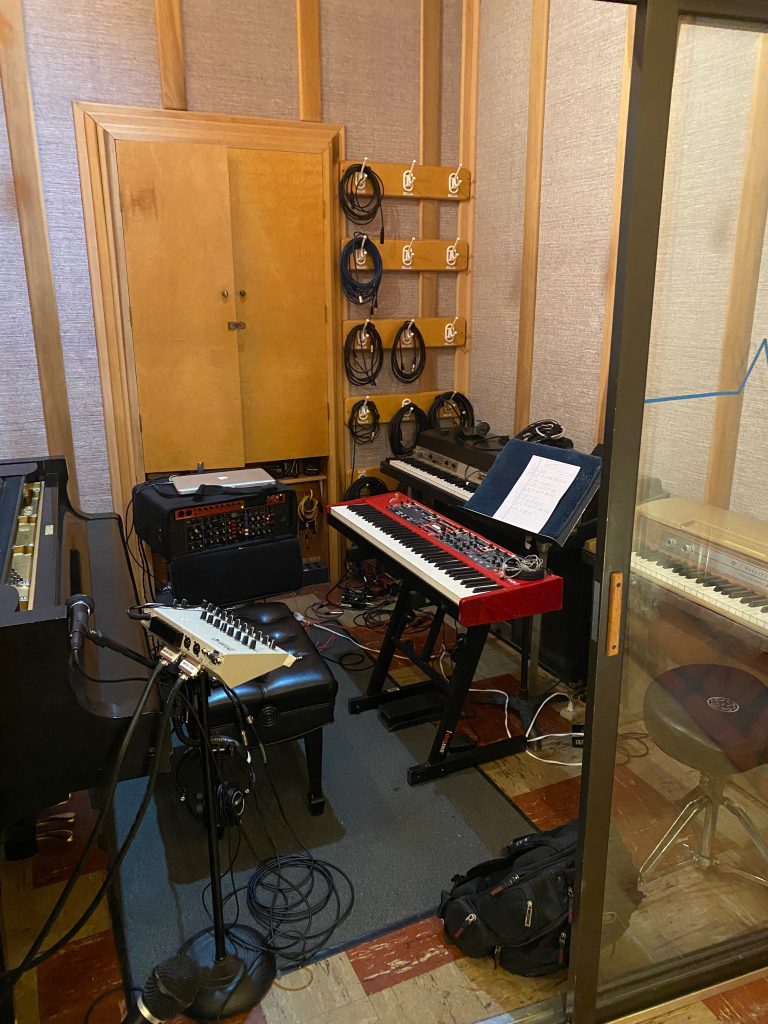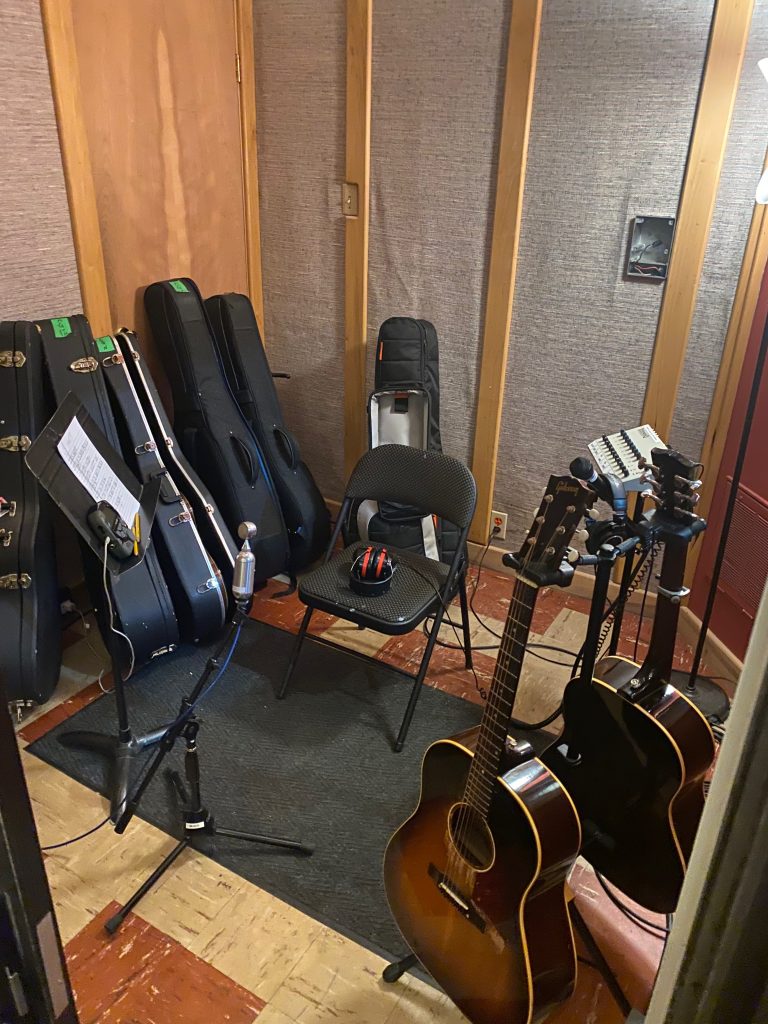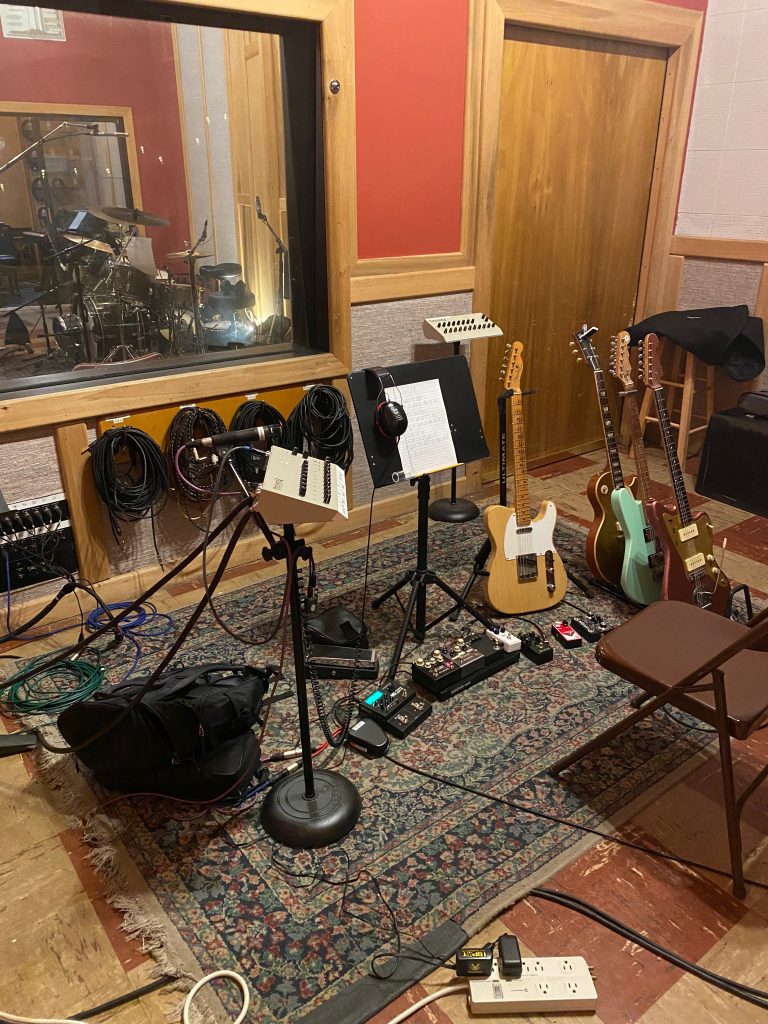Gehen wir’s an! (D)
Montag morgen 09:00 ist eine eher unbeliebte Zeit bei Audiomenschen (oder generell eine unbeliebt Zeit), doch hier in Nashville sind die Record-Buttons zu jeder Tageszeit scharf gestellt!
OmniSound Studios gibt es schon sehr lange, was die vielen goldenen Schallplatten und Auszeichnungen aus den vergangenen Jahrzehnten zeigen. Der größte Teil, „Studio A“, ist mit einer API Konsole, einer Genelec Abhöre und diversem Outboard, sowie Bandmaschine ausgestattet. Der dazugehörige Aufnahmeraum hat mehrere kleine, durch Glastüren verbundene Iso-Booths, was ihn perfekt für Live Recordings mit voller Bandbesetzung macht.
„Studio B“ ist eine zweite, kleinere Regie mit einem kleinen Aufnahmeraum. Hier finden viele Vocal Recordings, aber auch Producing und Mixing Sessions statt. In einem Nebengebäude befindet sich eine weitere Regie mit Icon Controller. Diese wird hauptsächlich für Mixing und kleinere Vocal Recordings im angrenzenden Vocal Booth verwendet.
In einer Lounge mit Küchenzeile kann man zwischendurch entspannen. Der ganze Komplex ist sehr gemütlich und hat einen guten Flair. Man hat das Gefühl alle kommen sehr gerne hierher, Nicht zuletzt aufgrund des jungen und sympathischen Staff bestehend aus Studio Manager Tyler, Chief Engineer Rory, Assistant Engineers Josh und Trent sowie PraktikantInnen.
Die Studioszene in Nashville ist einzigartig, das wurde mir bereits an meinem ersten Arbeitstag bewusst. Recording Sessions werden in bestimmten Zeitfenstern vergeben, zum Beispiel 10:00 bis 13:00, 14:00 bis 17:00 oder 18:00 bis 21:00 Uhr.
Heutzutage sieht man es eher selten, dass ganze Bands gemeinsam Live Recorden, doch hier ist es noch immer gang und gebe. Aufgrund des wahnsinnig hohen Levels auf dem gearbeitet wird sind auch Recordings in diesem Umfang sehr schnell erledigt.
Die meisten MusikerInnen in den Studios sind als „Session Musicians“ tätig, das bedeutet sie werden von ProduzentInnen oder Studios engagiert um Songs von Artists einzuspielen. In der Praxis läuft eine Produktion etwa so ab:
Das Studio oder der/ die ProduzentIn bekommt den Auftrag für ein Recording. Daraufhin kontaktieren sie Session MusikerInnen (man hat einen Pool an guten Leuten bei der Hand). Einer oder eine davon wird als „Bandleader“ engagiert und ist dafür zuständig die Charts für die ganze Band auf der Basis von Demo Aufnahmen zu schreiben.
Am Tag des Recordings wird von Seiten des Studios alles vorbereitet, aufgebaut, mikrofoniert und gepatcht. Alle Verbindungen und die korrekte Einbindung des Outboard Equipments wird überprüft. Dann treffen die MusikerInnen ein und bekommen die Charts vom Bandleader. Das Demo wird ein- bis zweimal durchgehört und jeder macht sich individuelle Notizen auf den Charts.
Das Ganze wird kurz durchgespielt, die Signale nochmals kontrolliert und schon wird der Song aufgenommen. Das eigentliche Recording ist meistens in kürzester Zeit erledigt, da jeder genau weiß was zu tun ist und die professionellen MusikerInnen kaum Fehler machen.
Sobald alles „im Kasten“ ist wird sofort vom Personal des Studios ab- bzw umgebaut für die nächste Session.
Das erwähnte Niederschreiben der Songs erfolgt in sogenannten „Nashville Charts“. Eine Art Songs zu notieren, die sich seit vielen Jahren in der Stadt und unter den MusikerInnen etabliert hat. Es wird dabei keine bestimmte Tonart angegeben sondern nur Takte und Stufen. Das erlaubt es sehr schnell zwischen verschiedenen Tonarten zu springen.
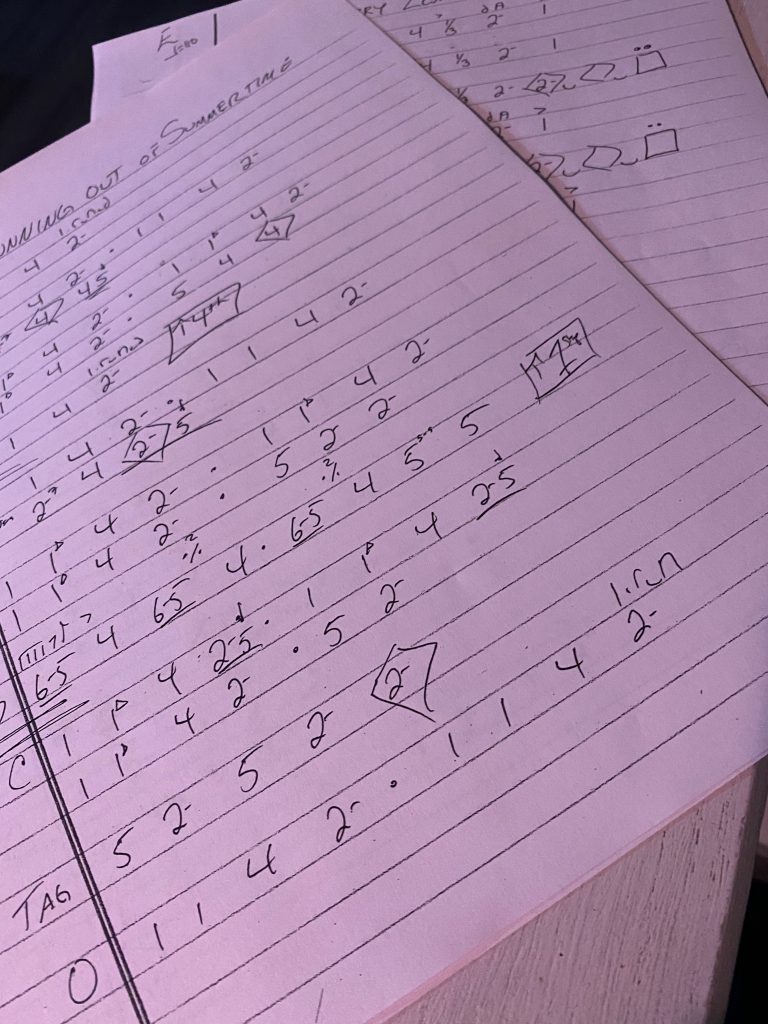
Als Praktikantin bin ich grundsätzlich die erste und als letzte Person im Haus. Man hilft bei Session Setups und behält allgemein den Überblick im Studio und steht bereit falls etwas gebraucht wird (Noten kopieren, Wasser bereitstellen, Kaffe kochen, Küche sauber halten,..). Grundsätzlich gilt das Prinzip „watch and learn“ aber wenn man sich gut anstellt darf man hin und wieder auch die Aufgaben eines Assistant Engineers übernehmen. Alleine das Zusehen bringt extrem viel, da extrem gute und erfahrene Engineers und Produzenten ihre Weisheiten teilen.
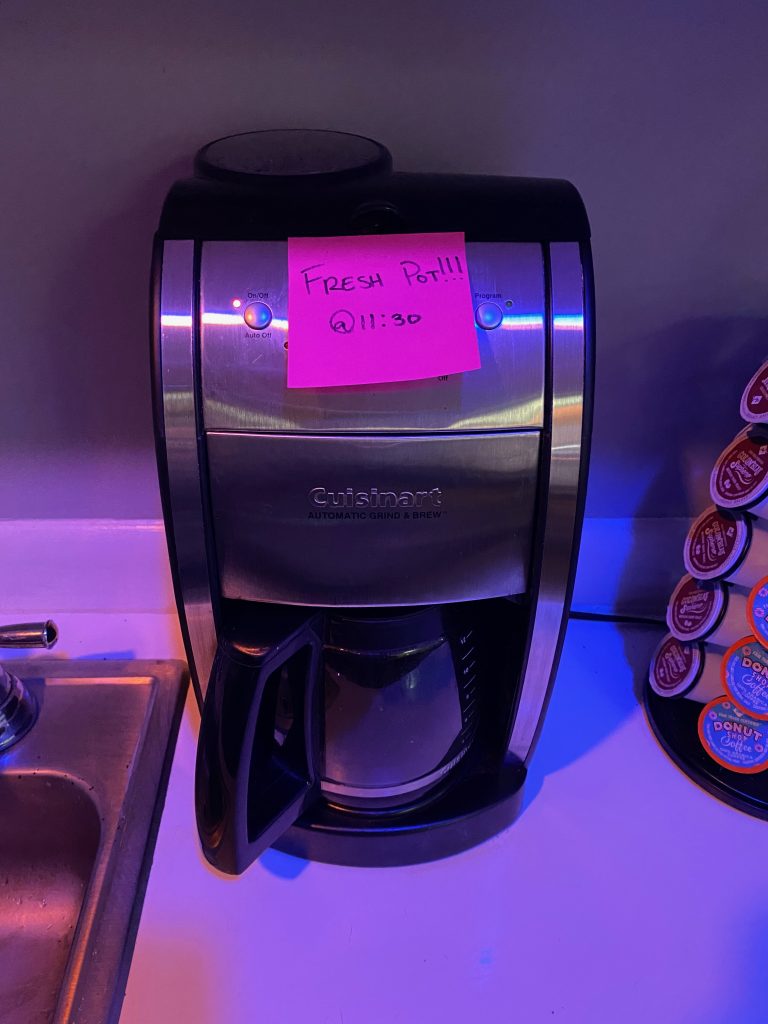
An meinen ersten drei Tagen konnte ich bereits 3 verschieden Engineers bei der Arbeit beobachten und mir sehr viele wertvolle Tipps mitnehmen.
Let’s get to work! (E)
Monday morning 9:00 am is a rather unpopular time for audio people (or generally an unpopular time of the day), but here in Nashville the record buttons are flashing at any time of the day!
OmniSound Studios has been around for a long time and has seen a lot of famous clients which is why the walls are equipped with a variety of gold records and awards. The main complex is called “Studio A” and includes a large control room, equipped with an API console, a Genelec monitor and various outboards, as well as a tape machine. The recording room is located right next to it and has several small iso-booths connected by glass doors, which makes it perfect for live recordings with a full band.
“Studio B” is a second, smaller control room with a recording booth. A lot of vocal recordings, but also producing and mixing sessions take place here. Another studio starring an icon controller is located in an adjoining building. It is mainly used for mixing and small vocal recordings.
In between recordings a lounge with kitchenette, offers some space to relax. The whole complex is very cozy with a chilled flair. It seems like everyone enjoys their time here, not least because of the young and friendly staff consisting of studio manager Tyler, chief engineer Rory, assistant engineers Josh and Trent as well as interns.
The studio scene in Nashville is unique – I realized that on my first day at work. Recording sessions are set to time windows, for example 10:00 to 13:00, 14:00 to 17:00 and 18:00 to 21:00. Nowadays you rarely see whole bands recording live together, but here it is still common. Due to the high level of professionality even big recordings can be finished very quickly.
Most musicians you meet in the studio exclusively work as “session musicians”, which means that they are hired by producers or studios to record songs. A production generally looks something like this:
The studio or the producer is being hired by an artist to track a song. The studio or producer contacts session musicians (they usually have a pool of good people that they alwaya call). One of the hired musicians is called the “band leader” and is responsible for writing the charts, i.e. writing down the song for the rest of the band according to demo recordings sent by the artist.
On the day of the recording everything is prepared, set up und patched by the staff of studio. All connections and the correct integration of the outboard equipment are checked. When the musicians arrive they are being handed the charts written down by the band leader. All together they listen once or twice and everyone takes notes.
The whole song is played through, the signals are being checked and adjusted if necessary and after that the song is recorded. The actual recording is usually done in a very short amount of time, because everyone knows exactly what to do and the musicians don’t make any mistakes.
As soon as everything is “in the box”, the studio staff immediately tear everything down and prepare for the next session.
The songs are written down in so-called “Nashville Charts”. A way of bringing songs to paper that has been established in the city and among musicians for many years. It allows you to jump between different keys very quickly.
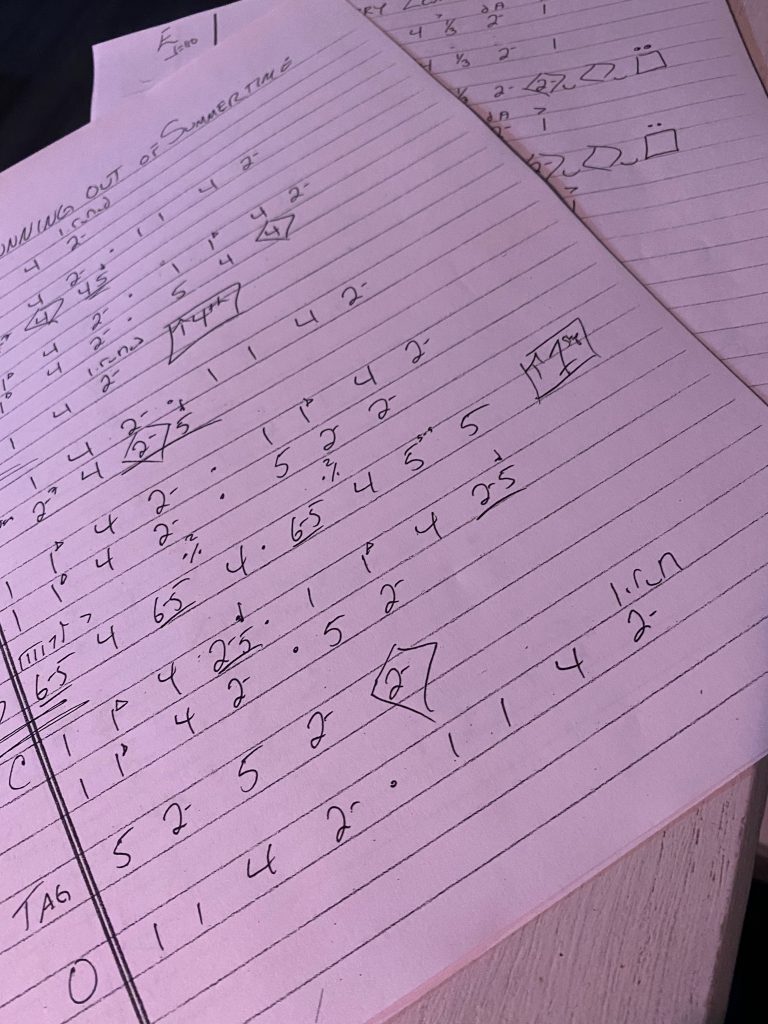
As an intern, you are basically the first and last person in the house. You help with session setups and generally keep an overview. You need to be available if something like water, coffee or copies are requested and you keep spaces like the kitchen clean. The basic principle for a studio intern is “watch and learn”, but if you are doing a good job, you will be asked to take on the tasks of an assistant engineer every now and then. But even watching and observing is of value, because you get to experience first hand how all the sophisticated and experienced engineers and producers operate.
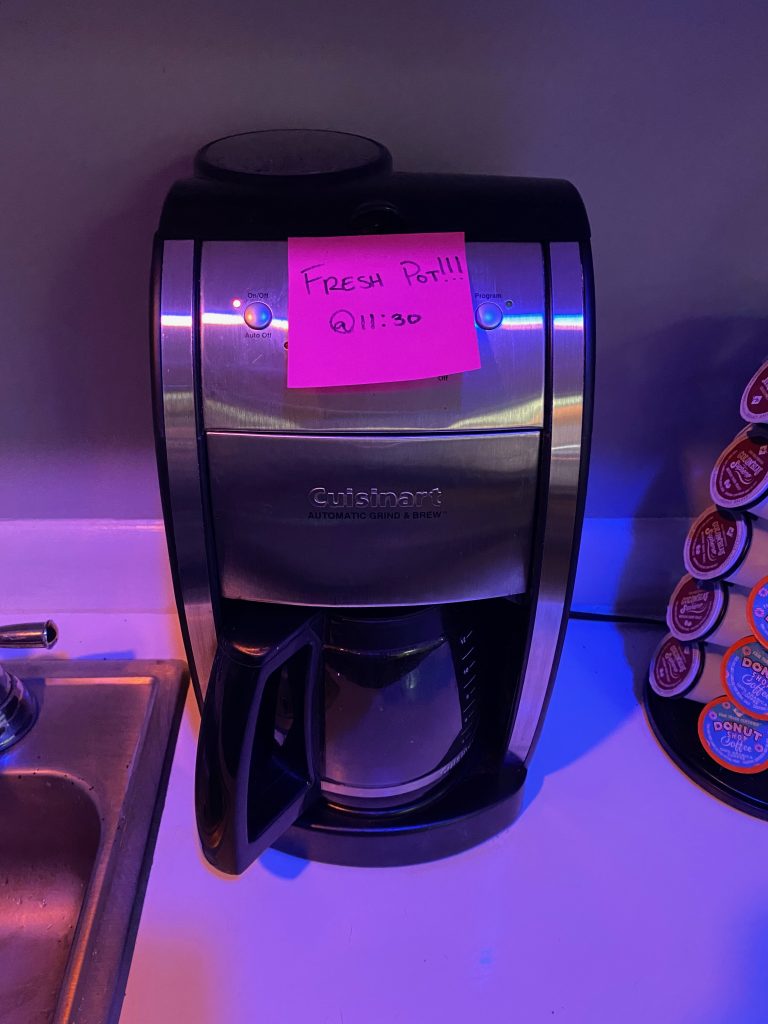
On my first three days I was able to observe 3 different engineers at work and take a lot of valuable tips with me.
